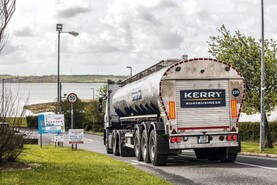A new circular economy project led by Munster Technological University (MTU) will advance technology which would create zero waste from the dairy processing sector.
CircBioCityWaste will involve the conversion of dairy sludge into a sustainable fertiliser for use on farms.
The project, led by Dr Gaurav Rajauria, has secured funding from the Environmental Protection Agency (EPA) and Department of Agriculture.
The sustainability work will focus on the southwest region of Ireland and partners MTU with University of Limerick, Technological University Dublin, clean technology company BHSL and the Circular Bioeconomy Cluster South-West.
The project aims to create bio-based fertilisers and biochemicals for the agriculture, food, cosmetic and pharmaceutical sectors.
Fertiliser
Speaking to the Irish Farmers Journal, Dr Rajauria said that currently, all the ingredients for the fertilisers used on Irish farms are coming from outside of the European Union and explained how his team’s work could process some of the required components here instead.
He said the waste water created in processing milk is taken away by specialised companies to be treated through anaerobic digestion.
The process contributes to 'closing the loop' of product lifecycles
He described how this anaerobic digestion can create energy and said it is at this stage where his team’s technology comes in.
After the energy is collected, he said the bio-stimulant “ash waste product” left behind is rich in minerals and is suitable for use in fertiliser.
In this way, the project team says the process contributes to “closing the loop” of product lifecycles through greater recycling and reuse, and brings benefits for both the environment and the economy.
Alignment
The sustainability project, which will commence in spring 2022, aligns with the EU Action Plan for a Circular Economy, Ireland’s Waste Action Plan for a Circular Economy, Ireland’s National Policy Statement on Bioeconomy, the recent Whole of Government Strategy on the Circular Economy and the Climate Action and Low Carbon Development (Amendment) Act 2021.
Education and outreach manager at the Circular Bioeconomy Cluster South-West Catriona Power said that the initiative will involve stakeholder engagement and consultation over the coming months as the team commences their work.
She said farmers will be invited and encouraged to participate.
On the potential for the technology applied in the project, Power said there is “scope for replication” across multiple farm sectors and that the team is studying case studies from similar projects elsewhere in the EU.
Read more
Opportunities for farmers tops agenda at first bioeconomy forum meeting
A new circular economy project led by Munster Technological University (MTU) will advance technology which would create zero waste from the dairy processing sector.
CircBioCityWaste will involve the conversion of dairy sludge into a sustainable fertiliser for use on farms.
The project, led by Dr Gaurav Rajauria, has secured funding from the Environmental Protection Agency (EPA) and Department of Agriculture.
The sustainability work will focus on the southwest region of Ireland and partners MTU with University of Limerick, Technological University Dublin, clean technology company BHSL and the Circular Bioeconomy Cluster South-West.
The project aims to create bio-based fertilisers and biochemicals for the agriculture, food, cosmetic and pharmaceutical sectors.
Fertiliser
Speaking to the Irish Farmers Journal, Dr Rajauria said that currently, all the ingredients for the fertilisers used on Irish farms are coming from outside of the European Union and explained how his team’s work could process some of the required components here instead.
He said the waste water created in processing milk is taken away by specialised companies to be treated through anaerobic digestion.
The process contributes to 'closing the loop' of product lifecycles
He described how this anaerobic digestion can create energy and said it is at this stage where his team’s technology comes in.
After the energy is collected, he said the bio-stimulant “ash waste product” left behind is rich in minerals and is suitable for use in fertiliser.
In this way, the project team says the process contributes to “closing the loop” of product lifecycles through greater recycling and reuse, and brings benefits for both the environment and the economy.
Alignment
The sustainability project, which will commence in spring 2022, aligns with the EU Action Plan for a Circular Economy, Ireland’s Waste Action Plan for a Circular Economy, Ireland’s National Policy Statement on Bioeconomy, the recent Whole of Government Strategy on the Circular Economy and the Climate Action and Low Carbon Development (Amendment) Act 2021.
Education and outreach manager at the Circular Bioeconomy Cluster South-West Catriona Power said that the initiative will involve stakeholder engagement and consultation over the coming months as the team commences their work.
She said farmers will be invited and encouraged to participate.
On the potential for the technology applied in the project, Power said there is “scope for replication” across multiple farm sectors and that the team is studying case studies from similar projects elsewhere in the EU.
Read more
Opportunities for farmers tops agenda at first bioeconomy forum meeting






 This is a subscriber-only article
This is a subscriber-only article










SHARING OPTIONS: